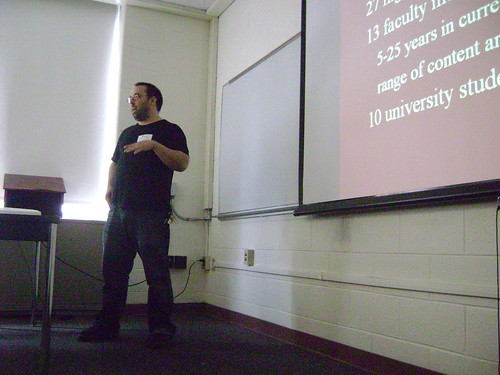Dynamic reflection
What keeps you going? It is a common question volleyed towards teachers and is often answered with jokes and trite responses. I do not buy any of them, though I am guilty of using some of those old war horses from time to time.
Three things: June, July, and August
I do it for the kids.
blah, blah, blah
We are educators. We are trained. We are practiced. Many of us are polished and take great pride in our work. Many of us also enjoy the same self-deprecating humor. Dare I say that there are commonalities of temperament among career-educators?
In reality, it is the desire to improve and the desire to see our improvement exhibited through the achievement of others. It begins with us; it begins with you. It sounds like a joke, but it is not.
Education reform begins with you, not me. We are not capable of changing ourselves in the meaningful ways that education requires. But we can change each other and if we are successful, we can expect the same in return.
Dynamic reflection is a necessity. It is our lifeblood. It is the metacognitive practice that operates in the mind of the educator. Calibrating. Recalibrating. Examining faces, responses, reactions, non-reactions, and queries for fault and options for improvement and revision. Like an indestructible toy that keeps righting itself no matter what the obstacle, the teacher presses on through the class searching for that open window, a crack in the door; some way into that brain!
Some of these calibrating factors are common and not worthy of conversation. On a regular basis, however, the need arises for an adjustment.The educator must step outside of self and reflect with a harsh mirror. Not a
dance studio mirror, mind you, where the reflections are all long, lean,

and strong characters. This is not The Chorus Line rogues’ gallery filled with beauty and insecurity–muscles and legs til Tuesday. This is the mirror of the observer. The visitor. The person in the back of the room.
If the need for this kind of intervention is not common to you, or if this concept seems like one for the extreme cases or the weak…then you need to pay close attention.
Dynamic reflection requires two key components.
The first component for dynamic reflection is what is commonly referred to as cognitive load. Cognitive load is the amount of different processes that your brain can manage successfully. Consider computers that once operated in a serial manner–one process at a time. Later computers possessed parallel processors, and now are capable of running several processes simultaneously without any dip in processing speed or accuracy.
In the brain, this method of multiple processes is happening all the time. Your mind is taking in information constantly and is discriminating what is and is not important to you. Important information is processed and addressed. If it is prioritized, it may cause other lower priority processes to cease.
How many of you turn down the radio when looking for a house number or when parallel parking? Be honest. That is your executive process making decisions and prioritizing your processing power.
How does this factor into dynamic reflection? We are only able to maintain so many processes while we are teaching. The catch is here: it is likely that we need to be most critical at times when we are least capable to maintain the cognitive load. Let me say that another way–when things are going well and we are cruising through content that we could teach in our sleep, we can devote more of our cognitive capacity to reflection on the fly. This reflection will likely produce the least interesting information for reflection and change. When we are in new content that requires more of our attention, and students are asking questions or resisting the instruction in some way, we are far too occupied to consider our teaching practice with the sober and careful honesty that it deserves and requires. We may even be so happy to escape certain death, that we fail to reflect adequately at all–or simply categorize it as a total failure so anything better than that is all win. We need more than we can do alone.
That is why collegial trust is so important. Collegial trust is not about trouble or blowing smoke. Collegial trust is most importantly about getting someone who is willing to accurately and honestly report on your teaching practice. To you. I encourage you to find a brutal critic. Build up some thick skin. Stay quiet, take notes, and change. Get used to it. Learn to love it. This person will become your best friend and may even be the person who saves your professional life. It may be important, to you, to find someone who is capable of keeping the observation confidential. Whatever.
Tell me the truth.
If you want to know the answer to longevity in education, the answer is dynamic reflection. Some may argue that this is true of many industries. I do not work in many industries, so I cannot comment on that. What I am able to say is that dynamic reflection both alone and with others is something that will change you and sustain you.
Think about it. Now think differently.



